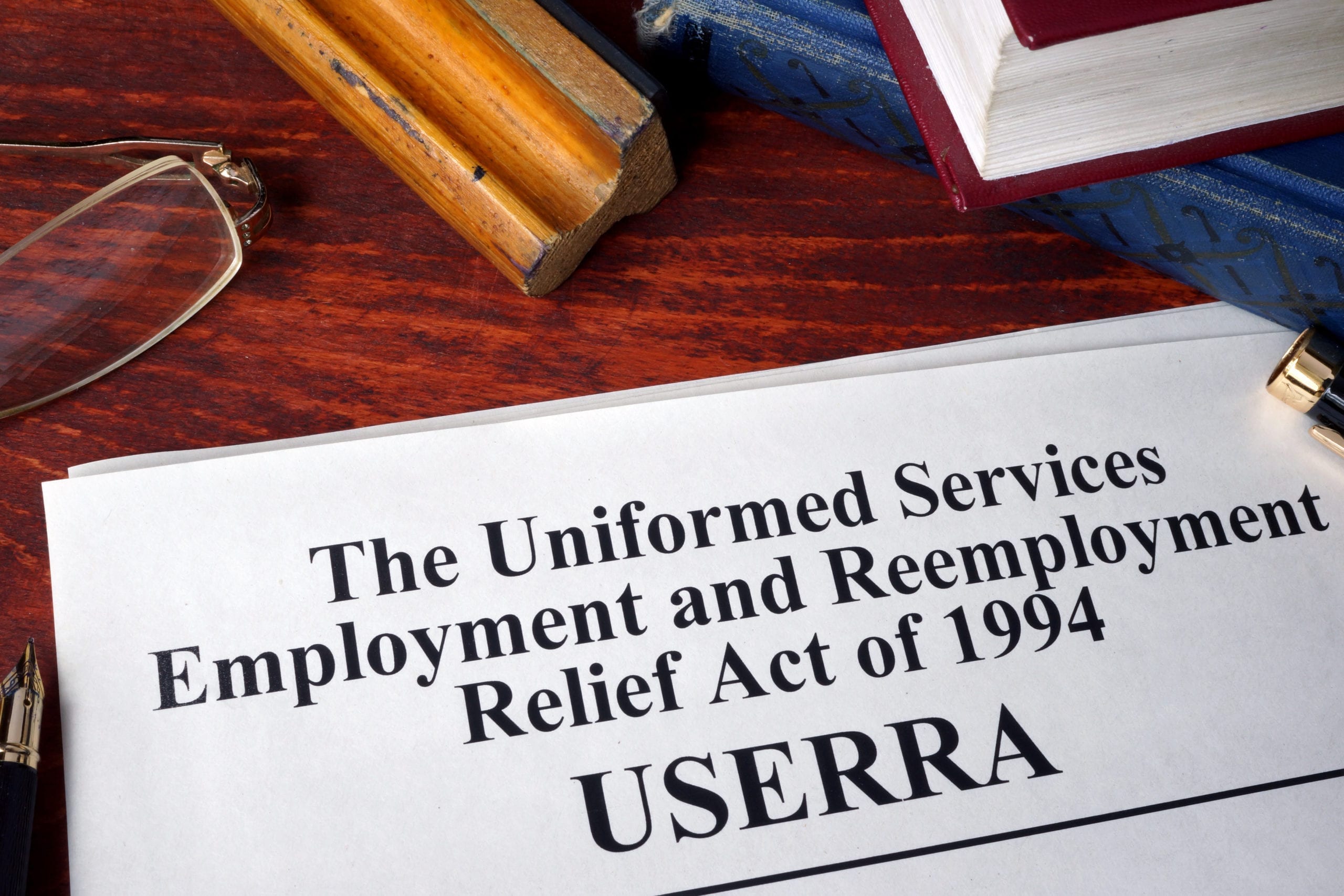BRIAN J GRABER LLC is a USERRA lawyer representing employees in Illinois, Indiana, and southwestern Michigan suffering from employment discrimination and retaliation as a result of their military status or military service obligations. The Uniformed Services Employment and Reemployment Act, (USERRA), 38 U.S.C. 4311(a) and (b) is the federal law that protects members of the armed forces from employment discrimination and retaliation as a result of their military service status and obligations to perform military service. USERRA was amended in January of 2025 and now provides broader protections for employment discrimination and retaliation and enhanced remedies. Click here to learn more about 2025 Amendments to USERRA. However, the enhanced remedies under the 2025 amendments to USERRA are still not as broad as the remedies available under the Illinois Service Member Employment and Reemployment Rights Act and the Illinois Human Rights Act.
BRIAN J GRABER LLC is a USERRA lawyer representing employees in Illinois, Indiana, and southwestern Michigan who are discriminated against or retaliated against because of their military status or obligations to perform military service in violation of their USERRA rights. If you believe your rights were violated under USERRA contact BRIAN J GRABER LLC for a free confidential consultation in Illinois at (312) 291-4648, in Indiana at (219) 232-9011, and in Michigan at (269) 230-6054.

USERRA Applies to All Employers.
USERRA broadly defines the term “employer” as follows:
The term “employer” means any person, institution, organization, or other entity that pays a salary or wages for work perfromed or that has control over employment opportunities, including — (i) a person, institution, organization, or other entity to whom the employer has delegated the perfromance of employment – related responsibilities; (ii) the Federal Government; (iii) a State; (iv) any successor in interest to a person, institution, organization, or other entity referred to in this subparagraph; and (v) a person, institution, organization, or other entity that has denied employment in violation of Section 4311.
USERRA, 38 U.S.C. 4303(4)(A)(i)-(v).
USERRA broadly defines the term “State” as used in the definition of “employer” as follows:
The term “State” means each of the several States of the United States, the District of Columbia, the Commonwealth of Puerto Rico, Guam, the Virgin Islands, and other terrotories of the United States (including the agencies and political subdivisions thereof).
USERRA, 38 U.S.C. 4303(15).
Therefore, USRRA applies to all private employers, federal government employers, state government employers, and local government employers (cities and counties).
USERRA Prohibits Discrimination against Persons Who Serve in the Uniformed Services.
USERRA defined the term “uniform services” as follows:
The term “uniform services” means the Armed Forces, the Army National Guard and the Air National Guard when engaged in active duty for training, inactive duty training, or full-time National Guard duty, the Commissioned Corps of the Public Health Service, the commissioned officer corps of the National Oceanic and Atmospheric Administration, System members of the National Urban Search and Rescuse Response System during appointment into Federal Service under section 327 of the Robert T. Stafford Diaster Relief and Emergency Asistance Act, intermittent personnel who are appointed into Federal Emergency Managment Agency service under section 306(b)(1) of the Robert T. Stafford Disaster Relief and Emergency Assistance Act or to train for such service, and any other category of persons designated by the President in time of war or national emergency.
USERRA, 38 U.S.C. 4303(17).
USERRA prevents employers from engaging in employment discrimination against employees in the “uniformed services” as follows:
A person who is a member of, applies to be a member of, performs, has perfromed, applies to perorm, or has an obligation to perform service in a uniformed service shall not be denied initial employment, retention in employment, promotion, or any benefit of employment by an employer on the basis of that membership, application for membership, performance of service, application for service, or obligation.
USERRA, 38 U.S.C. 4311(a).
USERRA defines the term “service in the uniformed services” as used in Section 4311(a) as follows:
The term “service in the uniformed services” means the performance of duty on a voluntary or involuntary basis in a uniformed servie under compentent authority and includes active duty, active duty for training, initial active duty for training, inactive duty training, full-time National Guard duty, State active duty for a period of 14 days or more, State active duty in response to a national emergency declared by the President under the National Emergencies Act (50 U.S.C. 1601 et seq.), State active duty in reponse to a major disaster declared by the President under section 401 of the Robert T. Stafford Disaster Relief and Emergency Assistance Act (42 U.S.C. 5170), a period for which a person is absent from a position of employment for the purposes of an examination to determine the fitness of the person to perform and such duty, a period for which a System member of the National Urban Search and Rescue System is absent from a position of employment due to an appointment into Federal Service under section 327 of the Robert T. Stafford Disaster Relief and Emergency Assistance Act, a period for which a person is absent from a position of employment due to appointment into service in the Federal Manamgement Agency as intermittent personnel under section 306(b)(1) of the Robert T. Stafford Disaster Relief and Emergency Assistance Act (42 U.S.C. 5149(b)(1)), and a period for which a person is absent from employment for the purpose of performing funeral honors duty as authorized by section 1250 of title 10 or section 115 of title 32.
USERRA, 38 U.S.C. 4303(13).

Employee’s Burden of Proof in a USERRA Employment Discrimination Claim.
An employee making a USERRA employment discrimination claim bears the initial burden of showing by a preponderance of evidence that the employee’s military service was a “substantial or motivating factor” in the adverse employment action. See Sheehan v. Dept. of Navy, 240 F.3d 1009, 1013 (Fed. Cir. 2001).
USERRA, 38 U.S.C. 4311(c)(1) sets forth the “prima facie” case an employee must prove by a preponderance of evidence as follows:
An employer shall be considered to have engaged in actions prohibited — under subsection (a) (38 U.S.C. 4311(a)), if the person’s membership, application for membership, service, application for service, or obligation for in the uniformed services is a motivating factor in the employer’s action, unless the employer can prove that the action would have been taken in the absence of such membership, application for membership, service, application for service, or obligation for service. . . .
USERRA, 38 U.S.C. 4311(c)(1).
The burden on the employee is to prove by a preponderance of evidence that his or her military status was a “motivating factor” in the employer’s adverse employment action. See Bradberry v. Jefferson Cnty., 732 F.3d 540, 551 (5th Cir. 2013). A person’s military service is a motivating factor if “it is one of the factors that a truthful employer would list if asked for the reasons for the decision.” Thomas v. Broward County Sheriff’s Office, 71 F.4th 1305, 1312 (11th Cir. 2023). In short, military service is a motivating factor for an adverse employment action if the employer “relied on, took into account, considered, or conditioned its decision” on the employee’s military-related absence or obligation. Erickson v. USPS, 571 F.3d 1364, 1368 (Fed. Cir. 2009). To succeed on an employment discrimination claim under USERRA, 4311(a), an employee must show: (1) that his or her employer took adverse employment action; (2) that he or she had performed, applied to perform, or had an obligation to perform as a member in the uniformed service; and (3) that the employer’s adverse action was taken on the basis of that service was a motivating factor in the action. See Kitlinski v. U.S. Dept. of Justice, 994 F.3d 224 (4th Cir. 2021).
Once the employee shows his or her military membership or performance of military service is one of the reasons for the adverse employment action, the employer may invoke the “same action defense.” See Geer v. City of Wichita, Kansas, 943 F.3d 1320, 1323 (10th Cir. 2019). The employer has the burden to prove the affirmative defense that it would have taken the same action anyway. See Garcia-Ascanio v. Spring Independent School District., 74 F.4th 305, 310 (5th Cir. 2023). Under this defense, the only way the employer can escape liability is if it can prove that it would have taken the same adverse action even if the employee had not been in the military. See Geer, 943 F.3d at 1323. If the employer cannot meet its burden on the “same action affirmative defense” the jury can consider awarding damages.
If you believe that your employer discriminated against you because of your military service or because of military service obligations contact BRIAN J GRABER LLC, a USERRA lawyer, for a free confidential consultation in Illinois at (312) 291-4648, in Indiana at (219) 232-9011, or in Michigan at (269) 230-6054.

USERRA Prohibits Retaliation for Protected Activities.
USERRA prevents employers from engaging in retaliation against employees engaging in protected activities as follows:
An employer may not discriminate in employment against or take any adverse employment action or other retaliatory action against any person because such person (1) has taken an action to enforce a protection afforded any person under this chapter, (2) has testified or otherwise made a statement in or in connection with any proceeding under this chapter, (3) has asisted or otherwise participated in an investigation under this chapter, or (4) has exercised a right provided for in this chapter. The prohibition in this subection shall apply with respect to a person regardless of whether that person has performed service in the uniformed services.
USERRA, 38 U.S.C. 4311(b).
The 2025 amendments to USERRA, 38 U.S.C. 4311(b), appear to have expanded the definition of “adverse action” to include “other retaliatory action.” The USERRA, 38 U.S.C. 4311(b), provides retaliation protections to employees who are not in the uniform services and who engage in the enumerated protected activities and suffer retaliation.
Employee’s Burden of Proof in a USERRA Retaliation Claim.
The burden of proof for a retaliation claim under USERRA is similar to the burden of proof on an employment discrimination claim under USERRA, as follows:
An employer shall be considered to have engaged in actions prohibited — under subsection (b), (38 U.S.C. 4311(b)), if the person’s (A) action to enforce a protection afforded any person under this chpater, (B) testimony or making a statement in or in connection with any proceeding under this chapter, (C) assistance or other participation in any investigation under this chapter, or (D) exercise of a right provided for in this chapter, is a motivating factor in the employer’s action, unless the employer can prove that the action would have been taken in the absence of such persons enforcment action, testimony, statement, assistance, participation, or exercise of a right.
USERRA, 38 U.S.C. 4311(c)(2).
In short, once an employee proves a prima facie case that his or her protected activity as described in 38 U.S.C. 4311(b)(1)-(4) was a motivating factor for any adverse action or other retaliatory action, the only way the employer can prevail is by proving by a preponderance of the evidence that it would have taken the same action in the absence of the employee’s protected activity.
If you believe that your employer retaliated against you because of your protected activity in USERRA, 38 U.S.C. 4311(b)(1)-(4) contact BRIAN J GRABER LLC, a USERRA lawyer, for a free confidential consultation in Illinois at (312) 291-4648, in Indiana at (219) 232-9011, or in Michigan at (269) 230-6054.

USERRA Does Not Have a Statute of Limitations.
Under USERRA, 38 U.S.C. 4327(b), there is no statute of limitations limiting the amount of time an employee has to bring claims of employment discrimination and/or retaliation against an employer. USERRA provides as follows:
If any person seeks to file a complaint or claim with the Secretary, the Merit System Protection Board, or a Federal or State Court under this chapter alleging a violation of this chapter, there shall be not limit on the period for filing the complaint or claim.
USERRA, 38 U.S.C. 4327(b).
While there is no statute of limitations on bringing a USERRA claim for employment discrimination and/or retaliation, you will want to bring your claims as soon as possible to prevent the destruction of electronically stored evidence or documentary evidence that can prove your claims from being destroyed. Additionally, Illinois employees may have claims for military discrimination and/or retaliation under the Illinois Human Rights Act that have broader remedies than USERRA but also have a statute of limitations. Click here to learn more about your rights under the Illinois Human Rights Act.
If you believe your employer discriminated against you or retaliated against you in violation of your rights under USERRA, contact BRIAN J GRABER LLC, a USERRA lawyer, for a free confidential consultation in Illinois at (312) 291-4648, in Indiana at (219) 232-9011, or in Michigan at (269) 230-6054.

Remedies for Discrimination or Retaliation in Violation of USERRA.
Under USERRA, 38 U.S.C. 38 U.S.C. 4323(a)(3), employees can file suit against a State employer, local governmental employer (cities and counties), and private employers in the U.S. District Courts. Employees can also file claims with the U.S. Department of Labor. Under USERRA, 38 U.S.C. 4323(d), a successful employee may be awarded the following forms of relief:
- The Court may require the employer to comply with the provisions of this chapter.
- The court may require the employer to compensate the person for any loss of wages or benefits suffered by reason of the employer’s failure to comply with the provisions of this chapter.
- The court may require the employer to pay the person the amount for any loss of wages or benefits and interest on such amount, calculated at a rate of 3% interest per year.
- The court may require the employer to pay the person the greater of $50,000.00 or the amount equal to the amount of any loss of wages or benefits plus the 3% interest as liquidated damages, if the court determines the employer knowingly failed to comply with the provisions of this chapter.
Under USERRA, 38 U.S.C. 4323(e), the court has full authority to award a successful employee any equitable relief. Any employee may also try to obtain injunctive relief under USERRA, 38 U.S.C. 4323(e)(2). Under USERRA, 38 U.S.C. 4323(h)(2), a successful employee can ask the court to award reasonable attorney fees, expert witness fees, and other litigation expenses.
The 2025 amendments to USERRA expanded some of the available remedies to employees for employment discrimination and retaliation. However, if you are an Illinois employee, you have broader remedies available under ISERRA and the IHRA for military discrimination and retaliation. Click here to learn how to maximize your damages if you are an Illinois employee suffering from military service discrimination and retaliation.
Contact BRIAN J GRABER LLC, a USERRA lawyer, for a free confidential consultation in Illinois at (312) 291-4648, in Indiana at (219) 232-9011, or in Michigan at (269) 230-6054.
